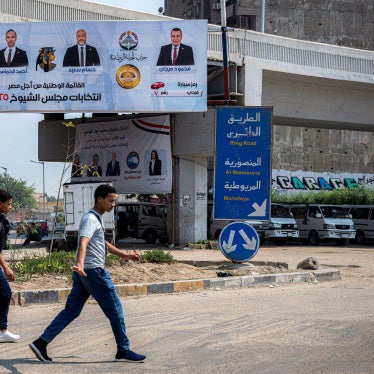Human Rights Watch released results of a week-long investigation that condemns Israeli police and security forces for a pattern of using excessive, lethal force in clashes with demonstrators over the past two weeks. In the report, Human Rights Watch also strongly criticized the failure of the Palestinian police to act consistently to prevent armed Palestinians from shooting at Israeli Defense Forces (IDF) from positions where civilians were present and thus endangered by the Israeli response.
Simultaneously with the release of the report, Human Rights Watch called on both Palestinian and Israeli authorities to take urgent steps to stop their own civilians from using lethal force against other civilians - an increasingly serious problem. Human Rights Watch also condemned the brutal October 12 killing by a Palestinian mob of two Israeli soldiers in the custody of the Palestinian police.
Human Rights Watch said its week-long investigation of clashes in the West Bank, Gaza Strip, and northern Israel showed repeated use by Israeli security forces of lethal force in situations where demonstrators posed no threat of death or serious injury to security forces or others. In situations where Palestinians did fire upon Israeli security forces, the IDF showed a troubling proclivity to resort to indiscriminate lethal force in response. At least 100 Palestinians have been killed and 3,500 injured in clashes with Israeli security forces. Human Rights Watch also expressed concern at the IDF's use of medium caliber munitions, which are meant for penetrating concrete and other hard surface barriers, against unarmed demonstrators in the West Bank and Gaza Strip. The military munitions were particularly devastating when they hit civilians.
The organization also condemned the repeated apparent targeting of emergency medical personnel and facilities by the IDF, as well as stoning attacks by Palestinian and Israeli civilians on ambulances.
Under international standards on the use of force by law enforcement officials, firearms may be used only "in self-defence or defence of others against the imminent threat of death or serious injury." Even then, law enforcement officials must "exercise restraint in such use and act in proportion to the seriousness of the offence and the legitimate objective to be achieved," and "minimize damage and injury, and respect and preserve human life."
"Civilians should not be dying in this conflict, on either side," said Hanny Megally, executive director of the Middle East and North Africa division of Human Rights Watch. "The Israelis should use lethal force only when it is strictly unavoidable to protect lives, and both sides need to rein in anyone attacking or endangering civilians."
Human Rights Watch noted that gunfire by Palestinians was a factor in some of the incidents it had investigated. In cases when Palestinian security forces or armed civilians fire on Israeli soldiers, international law enforcement standards require that Israeli forces direct lethal force specifically at the source of the threat and not deploy it in a manner that endangers unarmed individuals. Similarly, international standards require Palestinian authorities to stop Palestinian gunmen from firing from positions that endanger civilians.
"Both sides, Israeli and Palestinian, share an obligation to protect lives," Megally said. Megally deplored the increasing frequency and severity of attacks on civilians by civilians on both sides, and called on Israelis and Palestinians to oppose such attacks unconditionally. "Israeli and Palestinian leaders should condemn these acts publicly and without equivocation, and instruct security personnel to stop these attacks and bring the perpetrators to justice," he said.
Megally said the results of Human Rights Watch's investigation showed a compelling need for a credible and independent investigation into serious human rights violations in these clashes. He noted that under the Fourth Geneva Convention, which governs military occupations, Palestinians in the West Bank, the Gaza Strip, and East Jerusalem are internationally protected persons, and signatory states have an obligation to respect and ensure respect for rights and guarantees of the Convention.
The organization called on the special session of the United Nations Commission on Human Rights meeting this week in Geneva to authorize Mary Robinson, the High Commissioner for Human Rights, to set up an international panel of experts, working closely with the existing U.N. human rights mechanisms, including the special rapporteur on arbitrary and summary executions, to conduct an impartial investigation into human rights violations by all parties to the conflict. "This body should comprise internationally recognized law enforcement and human rights experts," Megally said. "To be most credible and effective, its members should be appointed not by governments directly but by the High Commissioner," he said.
Human Rights Watch also stressed that the current crisis in the Middle East highlighted the need for the U.N. to establish a standing body of independent international criminal justice investigators to be available for deployment by the UN at short notice whenever the need arises for independent, impartial investigations of a criminal justice nature. Human Rights Watch urged that the Commission on Human Rights create such a standing emergency-response capacity at this special session.
Joost Hiltermann, executive director of the Arms division of Human Rights Watch, and Clarisa Bencomo, researcher with the Middle East and North Africa division of Human Rights Watch conducted the fact-finding investigation from October 4 through October 11. Senior IDF officials did not accept Human Rights Watch's repeated requests for a meeting to discuss the organizations findings.








